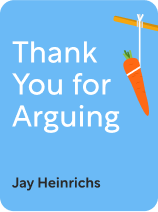

This article is an excerpt from the Shortform book guide to "Thank You for Arguing" by Jay Heinrichs. Shortform has the world's best summaries and analyses of books you should be reading.
Like this article? Sign up for a free trial here .
What is Jay Heinrichs’s Thank You for Arguing about? What is the key message to take away from the book?
In his book Thank You for Arguing, Jay Heinrichs explains not only how to persuade people to do what you want, but also how to help opposing groups find common ground, get a bully to talk himself down, and spot the faulty logic others use to manipulate you. He also discusses the importance of teaching rhetoric in schools.
Here’s a brief overview of the key themes.
Thank You for Arguing: What Aristotle, Lincoln, and Homer Simpson Can Teach Us About the Art of Persuasion
In Thank You For Arguing, Heinrichs aims to help you debate meaningfully, spot and call out weak arguments, and appeal to a wide audience. He hopes that if we learn these rhetorical skills that created democracy in ancient Greece and influenced America’s founding fathers, we’ll think more critically—transforming the way we talk about politics and helping us elect wiser, future-focused candidates rather than resorting to tribalism.
Jay Heinrichs, a professor of rhetoric at Middlebury College, originally wrote Thank You For Arguing in 2007 to rekindle interest in the lost art of rhetoric. It’s since become a New York Times bestseller and the leading modern text on rhetoric. He released a fourth updated version in 2020 to keep up with the ways political discussions are evolving, especially as social media amplifies opinions. Heinrichs notes that this book focuses more on talking politics than on politics themselves.
Why Should We Care About Rhetoric?
A knowledge of rhetoric—the art of persuasion—is valuable because persuasion shows up in many aspects of life, explains Heinrichs. If you’ve ever spoken with a salesperson, discussed a project with colleagues, listened to a political debate, or tried to reason with your child, you’ve dabbled in rhetoric.
(Shortform note: Heinrichs notes that many people don’t understand rhetoric because most schools have stopped teaching it in recent decades. Yet rhetoric’s importance is surging in our current knowledge economy. Studies show that up to 25% of America’s total income results from persuading others to act on ideas—for example, persuading investors to put their money into your project or persuading clients to choose your services over your competitor’s.)
Heinrichs argues that when you understand rhetoric, you can:
- Quickly discern what arguments are really about.
- Skillfully sway your audience to agree with you.
- Spot others’ attempts to persuade you and deflect them.
Rhetoric’s Revival
Heinrichs acknowledges that critical thinking and meaningful argument may seem hard to come by nowadays. He notes that a glaring issue driving this sentiment is our current political landscape. (Shortform note: A recent Gallup poll shows that Biden’s approval rating has the largest gap between parties of any president in recent history.) He says politics are becoming increasingly polarized due to two factors:
1) No one has a clear handle on what “truth” looks like anymore. Most people can’t agree on the value of information we receive from the government, media, and scientists. Heinrichs says this is largely because modern politicians build their campaigns around feelings, tribalism, and an appeal to morals, rather than facts and truth. For example, politicians discuss issues like abortion and climate change in terms of “wrong” and “right” rather than deliberating about an agreeable path forward.
(Shortform note: In Don’t Think of an Elephant! cognitive linguist George Lakoff explains that this framing is deliberate. Often, conservative politicians frame arguments in terms of wrong and right to appeal to their supporters’ cognitive biases, because they know that these biases whip people up into a defensive frenzy that helps obscure the truth of their statements.)
2) Deliberative argument isn’t considered effective against tactics like tribalism, which has become particularly dangerous to meaningful debate due to an evolving understanding of “virtue.” Heinrichs explains that, whereas virtue used to refer to middle-ground, future-focused decision making, we now consider someone “virtuous” if they choose a camp (or tribe) and defend their position no matter what. In modern rhetoric, compromise and consensus are not goals, but weaknesses.
(Shortform note: In How Democracies Die, Steven Levitsky and Daniel Ziblatt attribute the fierce tribalism in modern politics to former House Speaker Newt Gingrich, who believed in defeating his rivals—not working with them. In short, he viewed politics as warfare and formed the political-action committee GOPAC to train rising Republicans to follow similar no-compromise strategies. Levitsky and Ziblatt argue that by 1994, Gingrich had achieved his goal: a Republican Party entirely committed to their agreed-upon values and opposed to compromise.)
A Shift Away From Post-Fact America
On the positive side, Heinrichs contends that as schools increasingly reintroduce rhetoric into their curricula, more people will have the skills to debate meaningfully, spot weak arguments, and make decisions that benefit a wider range of people. He believes increasing rhetorical education could transform politics: Instead of depending on tribalism to succeed, candidates would have to demonstrate intelligence, disinterest, relevant experience, and a focus on the future.
(Shortform note: Heinrichs’s prediction may seem surprising—youth voter turnout is often low. However, this pattern isn’t due to apathy or disliking candidates, as many assume. Studies show that it’s mainly due to logistics—elections are largely inaccessible to youth due to timing, distance, or (in the case of mail-in ballots at the height of the Covid-19 pandemic) unclear instructions. As young people gain independence and experience, they may become better equipped, more consistent voters.)

———End of Preview———
Like what you just read? Read the rest of the world's best book summary and analysis of Jay Heinrichs's "Thank You for Arguing" at Shortform .
Here's what you'll find in our full Thank You for Arguing summary :
- Smarter ways to argue and evaluate others’ arguments
- How to persuade people to do what you want
- How you can get a bully to talk himself down






